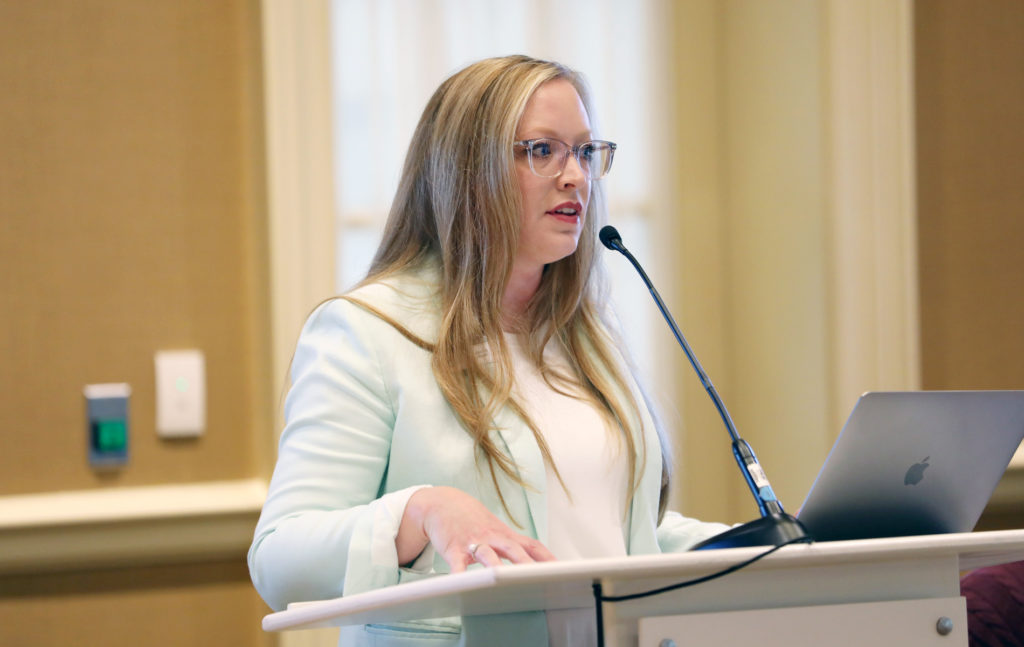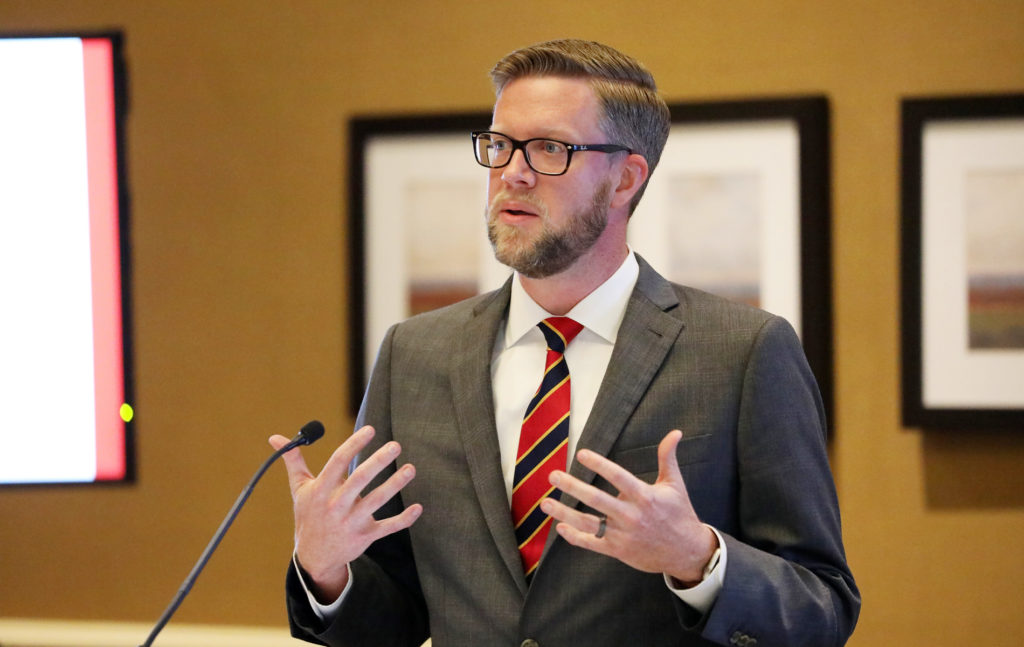
NASHVILLE (BP) – The Ethics & Religious Liberty Commission plans cutting-edge work the next 18 months on technology and pro-life issues, trustees of the Southern Baptist entity were told at their annual meeting.
Jason Thacker, chair of research in technology ethics, and Elizabeth Graham, vice president of operations and life initiatives, outlined the plans in their areas of responsibility during their reports to the ERLC board Sept. 15 in Nashville. Acting on the final day of their two-day meeting, trustees unanimously approved motions after both reports to affirm the work in both areas and to encourage the staff’s continued efforts.
Thacker unveiled to the trustees a new research project he is leading – the Digital Public Square. Launched after the trustees’ vote of affirmation, the project is designed to produce resources to assist churches and leaders to “navigate this digital age with wisdom and to think through some of the most complex and crucial ethics challenges to our faith with wisdom and insight,” he said in his report.
The project, Thacker said, will help answer such questions as:
- What is the proper role of government in digital governance?
- How do I disciple other people if they’re primarily being shaped by technology in their use and habits?
- How do we champion free speech and religious freedom in an increasingly polarized society?
The resources to be provided during the next 18 months consist of four major elements, he said: (1) A “state of digital governance report” that will present a portrait of current and future technological issues; (2) an evangelical Christian statement of principles on “content moderation and digital governance;” (3) a church resource kit scheduled to be released in the summer of 2022; and (4) two books to be published next year – “Following Jesus in the Digital Age” and “The Digital Public Square: Ethics and Religion in a Technological Society.” Thacker is writing the former for Broadman & Holman Publishing and editing the latter for B&H Academic.
“Given the current state of debate over the proper role of free expression and religious freedom and digital governance,” the ERLC believes this is an important area in which to invest, Thacker told the trustees. It will produce “substantive resources” and “seek to equip the church in the digital age and allow us to advocate for these principles in this important arena,” he said.
Thacker’s work on technology ethics the last several years has resulted in ongoing opportunities to “give critical feedback, as well as counsel, to a lot of these large technology companies, as well as their policy teams, as they’re forming and crafting” policies, he said. When one of those companies learned about the Digital Public Square project, it offered to provide support.
The project is funded by the Cooperative Program, the SBC’s unified giving plan, but Facebook Technologies LLC also provided a research grant after the effort was under way. Thacker provided assurances to the trustees and on the project’s website – www.erlc.com/digital – regarding the ERLC’s independence in accepting the grant.
“This research grant was provided on an unrestricted basis, meaning the grant monies will be used at [the] sole discretion of the ERLC leadership team and board of trustees without any direct or indirect oversight by Facebook in research efforts nor any influence on project outcomes or resources produced,” according to the answer to one of the Frequently Asked Questions on the website. “All materials produced in this research project will be copyrighted to the ERLC and/or the individuals contributing.”
Facebook and other technology companies have approached the ERLC for resources because “there is a dearth of literature in this area,” Thacker said to the trustees. “There’s been very little if any research done into the nature of religious freedom and religious expression in the digital age.”
Brent Leatherwood, named acting president at the board meeting, told trustees Thacker “is quickly cementing his reputation as one of the leading voices, if not the leading voice, in evangelicalism as it relates to technology ethics, and we believe this project is a natural place to house all of this research, to produce resources that will equip the church and to again just allow him to have a platform to speak into these issues.”

Graham described the ERLC’s pro-life work, including its leading role in a campaign with other organizations as the 50th anniversary of Roe v. Wade nears. The U.S. Supreme Court legalized abortion nationwide in its Jan. 22, 1973, decision in Roe.
The Road to Roe50 “is our short-term strategy to engage the church,” Graham said of the alliance, which she said also has mid-term and long-term strategies. “With this moment, we see the chance of a lifetime to bring awareness to our work and action to the church.”
The effort “is a strategic window of opportunity” the ERLC and its partners believe can “unify and mobilize the church” leading to Roe’s 50th anniversary, she told the trustees. “The purpose of Roe50 is to inspire, educate and activate the church to support and defend the dignity of each human person.”
The church is “not deeply engaged with the abortion issue,” Graham said, citing a series of statistics in multiple surveys as evidence. More than 60 percent of women who have had an abortion say they are “religiously affiliated,” according to a survey by the pro-abortion Guttmacher Institute that is supported by other studies, she said. A Lifeway Research survey sponsored by the pregnancy resource center network Care Net in 2015 showed 36 percent of women were attending a Christian church at least once a month at the time of their first abortion, she told the trustees.
“We need to make abortion illegal, but we need to make it unnecessary and unthinkable,” Graham said. “We believe the church is the answer. This is why the role of the church is so important. This is why what we’re doing and hoping to accomplish at the ERLC is so important.”
The church-engagement strategy of Road to Roe50 includes, Graham told the board:
- Curriculum for all ages that is designed as a three-year discipleship program. The separate material for children, teenagers and adults will have a prelaunch release in the fall of 2022, with a general release in January 2023.
- A Roe50, multi-state tour to strategic cities in the fall of 2022.
- A Roe50 event in Washington, D.C., in January 2023.
- A broad digital campaign to affirm life, as well as to train and mobilize people to serve “vulnerable moms, preborn babies and families.”
The ERLC and its partners are asking people to “join us on the Road to Roe50,” Graham said. “We want Southern Baptists to be leading the way [in] serving women and children” who are in crisis.
The ERLC’s other pro-life efforts include the Psalm 139 Project, which helps provide ultrasound technology to pro-life pregnancy centers. The ERLC has placed ultrasound machines at 18 centers so far this year, Graham told trustees in a committee meeting Sept. 14.
After Graham’s report, David Prince, presiding in his final meeting as the board’s chair, told the other trustees, “There is not an evangelical organization in the world doing life work with the depth and breadth of the ERLC. And a lot of other organizations are bolstered by the fact that the ERLC is doing life work with such depth and breadth.”
















